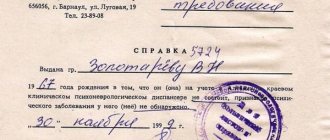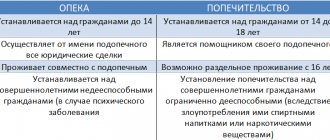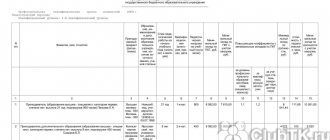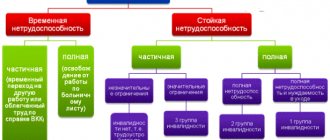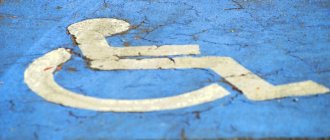Citizens with disabilities are considered to be persons who, due to physical and mental disabilities, do not have the opportunity to independently care for themselves and lead a full life. They are the ones who need the help of other people in everyday life and in other ways. In this case, many are interested in how much they pay for guardianship of a group 1 disabled person.
The law establishes that guardians have rights to certain benefits. In addition, caregivers have clear rights and responsibilities, in case of violation of which the agreement on granting guardian status will be terminated.
How to obtain guardianship over a disabled person of group 1
Not everyone can become a guardian of a group 1 disabled person. Caring for a disabled person, often unable to provide for their own personal needs, is hard work. Those who wish to formalize guardianship over a disabled person are subject to certain requirements; if they are not met, the Pension Fund will refuse to formalize guardianship and conclude an agreement:
- the guardian must be at least 18 years of age;
- he must be capable and healthy;
- he should not be deprived of parental rights;
- he must not have a criminal record;
- he should not be registered in a psychoneurological dispensary.
First of all, you need to go to the local department of social protection of the population in order to fill out an application, which would indicate the desire to formalize guardianship over a disabled person of group 1. Together with the rest of the documents discussed below, it will be transferred to USZN specialists, who will review them within 14 days. If the decision is made in favor of the applicant, he will be summoned to the social security department to sign papers and receive the status of a guardian of a disabled person. If he is denied, he will receive a notice stating the reasons for the denial.
Responsibilities and rights of guardians of disabled people
As already noted, guardianship of a disabled person is strictly regulated by current legislation. In this regard, the citizen must fulfill his duties towards the person under his guardianship. The main responsibilities include the following:
- ensuring normal living conditions for a citizen with a disability;
- purchasing food for the person under care and preparing food;
- provision of medical care, including trips to sanatoriums and other medical institutions for mandatory examinations;
- maintain order and cleanliness in the home according to certain sanitary standards;
- represent the ward in various government agencies and before third parties.
In addition to duties, a guardian also has a number of rights:
- living in the living space of a disabled person being cared for;
- receive money from the state budget for the care provided;
- free travel to the place of health-improving activities for a disabled person and when accompanied by the person under guardianship to the place of examination;
- the right to claim the property of a disabled person (movable and immovable) after his death, but with the consent of the ward.
What documents are needed to register guardianship of a disabled person?
To prove your suitability to become a guardian of a disabled person, you must provide the following set of documents to USZN employees:
| Document | Where to get it |
| Russian passport | Ministry of Internal Affairs of the Russian Federation |
| Certificate of registration at place of residence | Passport Office |
| Brief autobiography of the applicant (in free form) | – |
| Application form of an applicant for the status of a guardian of a disabled person (in free form) | – |
| Certificate of no criminal record (has a limited validity period - 1 month) | Internal Affairs Bodies |
| Documents confirming the presence of family ties (if there are family ties) Birth certificate, marriage certificate, divorce certificate, certificate from the Federal Migration Service, certificate from the Municipal Administration, etc. | Civil registry offices, local government bodies, Federal Migration Service of the Russian Federation |
| Certificate of income of the future guardian | At the place of work, Employment Center, Pension Fund |
| Conclusion of a medical and social examination or a court decision declaring a person incompetent | ITU Bureau, Clerk of the Court |
| Written consent of the relatives of a disabled person to establish guardianship | Close family members of a disabled person |
Decor
To obtain the right to care for a disabled person, a citizen must take care of registering his status. To do this, they must take several actions:
- Obtain a document that certifies that a person has been recognized as disabled.
- Receive a document that indicates that the candidate is legally competent.
- Contact a government agency with all collected documents.
- Receive a document confirming the appointment of guardian status.
Application form for appointment of guardian status
You can submit such an application to the guardianship department located at the place of permanent residence of the disabled person. The decision is made within 15 days from the date of receipt of the complete package of documents.
Read also: Benefits for employees of the Ministry of Internal Affairs
In order to subsequently receive all the entitlements, a person must take the following steps:
- Collect all necessary documents.
- Submit an application to the Pension Fund.
- Coordinate the receipt of payments with the ward person.
- Receive payments and continue to care for the disabled person.
In practice, the procedure for obtaining the status of a guardian is fraught with many difficulties; a person has to prove for a long time that he really meets all the criteria stated by law.
Documentation
To start enjoying all the benefits entitled to a guardian, a person must contact the Pension Fund of the Russian Federation at the place of residence of the disabled person and provide the following documents:
- Statement. Moreover, this document must be drawn up both from the applicant himself and from the disabled person under his care.
- A certificate from the Pension Fund of the Russian Federation, which confirms that the guardian is actually caring for a person with a disability.
- A certificate received from the employment center confirming that the guardian is not receiving unemployment benefits.
- Disability statements from ITU.
Sample statement of disability from ITU - A conclusion from a doctor, which states that a person with a disability must be constantly cared for.
- Guardian's passport.
- Work records of both the guardian and his ward.
On a note! If the guardian did not apply for payments immediately after receiving his status, he has every right to do so later. All missed months will be compensated. The maximum period for such a return is three years.
What payments are provided for guardians of group 1 disabled people?
The amount of payments will depend on the region of residence of the guardian and the disabled person for whom he is caring.
Among the payments intended for guardians of disabled people of group 1 are the following:
- Monthly benefits in the amount of 3357 rubles .
- Disability pension. For guardians caring for a disabled person whose disability was acquired during life, the amount of the pension payment will be 9,538 rubles . If we are talking about looking after a disabled child, the pension increases to 11,445 rubles .
- Payments established for a father or mother forced to leave their job to care for a disabled person of category I. The benefit amount is 60% of the minimum wage in the region.
Benefits and pensions are paid both to carers who are relatives of disabled people and to carers who have been hired to look after a disabled person. The only monthly allowance issued by the guardian for himself may be lower.
Types of government support
Let's take a closer look.
Where to find out what kind of help you can get
Tax deductions
A person who cares for a disabled citizen has the right to count on receiving standard and social tax deductions.
Read also: Return of pension savings
The standard tax deduction is 6,000 rubles. Social deductions are provided on the basis of a pension or insurance agreement with the state. Moreover, the above documents must necessarily be issued to the disabled citizen, and not to the guardian caring for him.
Benefits for guardians of incapacitated disabled people
If a person takes care of a disabled person who has been officially declared incompetent, he has the right to count on receiving a number of benefits and privileges from the state.
But despite the complexity of the task assigned to him, the amount of payments will still be less than for guardianship of a disabled minor. The resolution regulates only the minimum amount of benefits that must be paid to such citizens. At the moment, this minimum is only 1,200 rubles. In each region of the Russian Federation, the authorities have the right to independently revise the amount of payment and set it at a level acceptable to the budget.
Attention! Providing benefits is possible only for those citizens who are caring for an incapacitated person. Moreover, there are no requirements at the legislative level regarding the presence or absence of a guardian’s official place of work.
In addition to financial payments, citizens are provided with the following state support measures:
- Possibility of free legal assistance.
- There is no fee when filing claims in relation to property whose value exceeds 1,000,000 rubles.
- All notary services are provided with a 50 percent discount.
Each region provides its own list of benefits provided to this category of citizens, so you can clarify the exact support measures only in your social security department.
For example, in Moscow an additional discount of 50 percent is provided when paying for major repairs. In addition, a 50 percent discount is provided when paying for an MTPL policy.
In most regions of the Russian Federation, guardians of incapacitated citizens are provided with the following additional support measures:
- Extraordinary provision of land for the construction of your own residential building.
- Exemption from payment of transport tax for a car with an engine power of up to 200 hp.
Payments for guardians of citizens with disability group 2
Transfers of funds for caring for a disabled person of the second group are carried out from the federal and regional budgets. The following benefits are currently set:
- 5,500 rubles for caring for a disabled child.
- 1,200 rubles when caring for certain categories of citizens with disabilities.
Payments to guardians of citizens with 1st disability group
Guardians of citizens with the first disability group have the right to receive monthly financial assistance from the state. The following types of state support are paid in the Russian Federation:
- The standard payment is 60 percent of the minimum wage established in the region of residence of the beneficiary.
- When caring for a disabled person from childhood, the payment amount is 11,445 rubles.
- The amount of additional benefit is 3,357 rubles.
Depending on the region of residence of the guardian, the amount of payment provided to him may differ significantly, since it is set by local authorities based on the available budget.
Getting additional privileges
Citizens who care for a disabled child have the right to apply for the following types of additional privileges:
- Half-holiday.
- Registration of four additional paid days off.
- Do not work on holidays and weekends, regardless of the schedule approved by the organization.
- Do not go to work at night.
- Don't work overtime.
- Do not go on business trips.
- Receiving additional unpaid leave, the duration of which is up to 14 days.
Read also: Debt restructuring
Citizens who care for children with certain diseases have the right to retire earlier. By law, every 18 months of such care removes one year of retirement age. The maximum number of years by which the age can be reduced is 5.
On a note! Families raising a sick child have the right to receive a discount on utility bills.
Benefits in the field of labor legislation
Citizens who provide care for persons with disabilities have the right to enjoy the following labor benefits:
- Possibility to work on a reduced schedule.
- Such citizens are given 4 additional days off per month, which are fully paid.
- The ability to not go to work on weekends and holidays, even if the organization provides for such a schedule.
- Possibility to refuse business trips and work overtime.
- Opportunity to take additional unpaid leave. The duration of such leave is 14 days within one year.
Tax benefits
Citizens who care for a person with a disability have the right to apply for a tax deduction. It comes in two types:
- Standard, the size of which is 6,000 rubles.
- Social, the size of which varies depending on the region of residence of the person and the characteristics of providing care for the disabled.
Social deductions are provided only for contracts issued in the name of a person under guardianship.
Benefits in the housing and communal services sector
Guardians of citizens with disabilities have the right to enjoy privileges in the field of housing and communal services.
In particular, they are given a discount on payment of housing and communal services bills, the amount of which is up to 50 percent. Most often, such a privilege is provided in the form of a subsidy, when a person is returned part of the money previously paid for utilities.
Benefits in the field of education
In the field of education, a guardian can only take advantage of the benefits provided for a child under his guardianship:
- If this is a full-time student, he is provided with financial support for the entire period of study.
- Discounts are provided for education in preschool institutions.
- The school provides two free meals a day.
- Free textbooks are provided.
Regional support measures
Most of the benefits are provided at the regional level. For example, in Moscow, guardians are provided with:
- reimbursement for utility bills;
- compensation for raising a child with a disability;
- financial support for a full-time student;
- compensation for raising an abandoned child.
In addition, material benefits are provided:
- Discount on preschool education.
- Free travel on public transport.
- Free two meals a day in an educational institution.
- Free medicines until the child reaches 3 years of age.
- Free textbooks.
Advice! In each region of the Russian Federation, the authorities have the right to independently adopt a list of benefits provided to guardians of disabled people. You can get acquainted with the privileges at the local social security office, as well as clarify the list of necessary documents for their registration.
Social benefits for guardians of disabled people of group 1
In addition to the payments that people who devote themselves and their time to caring for disabled people deserve, they are entitled to a certain set of social benefits. Here is a list of them:
- free ticket for any city transport;
- 50% discount on telephone services;
- reducing the amount of transport tax in relation to one vehicle;
- reduction of land tax in relation to one plot of land;
- exemption from property tax paid for one piece of real estate;
- free vouchers to health resorts;
- 50% discount on utility bills;
- benefits in the field of labor relations (mothers of disabled children under the age of 8 are given the right to work part-time or work on a reduced working day with payment for the time actually worked; involvement in overtime work and business trips only with the consent of the employee).
Common mistakes
Error: The remuneration of a guardian of a disabled person is estimated by him at 15% of the disabled person’s income.
Comment: Payments to guardians of disabled people cannot exceed 5% of the total income of the person under guardianship.
Error: A citizen who has been assigned a disabled group is going to become the guardian of a disabled person of group 1.
Comment: The conditions for obtaining the status of a guardian of a disabled person are good health and legal capacity of the future guardian.
Answers to common questions about benefits for guardians of group 1 disabled people
Question No. 1: Is it possible to hire a third person who is not related to the person with disabilities as a guardian for a group 1 disabled person?
Answer: Yes, the fact of having family ties does not affect the possibility of obtaining the status of a guardian of a disabled person and corresponding payments for one’s work.
Question No. 2: Can a minor become a guardian of a group 1 disabled person?
Answer: Yes, but only upon reaching 14-16 years of age and with the written permission of both parents, provided that all other requirements for guardians are met.
Subscribe to news
A letter to confirm your subscription has been sent to the e-mail you specified.
March 14, 2021 09:44
I would like to once again draw the attention of parents of children with disabilities since childhood to pension benefits. As practice shows, not all citizens are aware of their right to early assignment of an old-age insurance pension.
This is interesting: One-time payment to pensioners from the funded part of the pension
Clause 1 of Part 1 of Article 32 of the Federal Law of December 28, 2013 No. 400-FZ “On Insurance Pensions” provides preferential pension benefits to parents of disabled people since childhood.
The old-age insurance pension for this category of citizens is established before reaching the generally established retirement age.
One of the parents who raised a disabled child from childhood to the age of eight has the right to early assignment of an insurance pension:
- father - upon reaching the age of 55 years with at least 20 years of insurance experience;
- mother - upon reaching the age of 50 years with at least 15 years of insurance experience.
The determining factor is the recognition of the child as disabled either before 18 years of age, or after 18 years of age with a cause of disability - “disabled since childhood.” In this case, the duration of the period of being on such disability does not matter. A prerequisite is the upbringing of this child until he reaches the age of 8.
So, for example, a child aged 20 years old was assigned a second group disability for 1 year, the cause of disability being “disabled since childhood.” Or, a child aged 3 years was given a disability for a period of 2 years. Upon expiration of the established period, the disability was lifted.
In both cases, one of the parents, subject to all necessary conditions, may be granted an old-age insurance pension early.
If a disabled person has both parents since childhood, only one of the parents will have the right to an early insurance pension in connection with his upbringing until the age of eight. For example, the father of a person disabled since childhood may be assigned the specified pension if the mother of a person disabled since childhood is the recipient of a pension on another basis.
However, when this pension is established for one of the parents, the second subsequently retains the right to this type of pension and arises subject to the transition of the first parent to another type of pension. For example, the mother of a child who has been disabled since childhood is the recipient of this type of old-age insurance pension. Upon reaching the age of 55, she has the right to transfer to an old-age insurance pension on a general basis. After the mother is transferred to another type of pension, the father, if all the necessary conditions are met, can also be assigned an old-age insurance pension ahead of schedule as the father of a disabled person since childhood.
Early assignment of an insurance pension on this basis to both parents at the same time is possible for different children. For example, if there is more than one child in a family who has been recognized as disabled since childhood, and both parents raised them until they reached the age of 8.
Also, the right to receive an old-age insurance pension of a previously established retirement age is enjoyed by guardians of disabled people since childhood, and by persons who have been guardians of disabled people since childhood, even if they are not such at the time of applying for a pension. For this category of citizens, the retirement age is reduced by one year for every one year and six months of guardianship, but not more than 5 years in total, if they have an insurance record of at least 20 and 15 years, respectively, men and women. The age at which the right to an early old-age pension can be exercised is determined proportionally depending on the length of the period of guardianship over a disabled child. In this case, a mandatory condition is the establishment of guardianship and upbringing of the child until the age of 8. The duration of guardianship for the right to early retirement is determined only taking into account the periods when the child was recognized as disabled.
